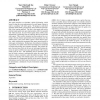Free Online Productivity Tools
i2Speak
i2Symbol
i2OCR
iTex2Img
iWeb2Print
iWeb2Shot
i2Type
iPdf2Split
iPdf2Merge
i2Bopomofo
i2Arabic
i2Style
i2Image
i2PDF
iLatex2Rtf
Sci2ools
121
click to vote
ATAL
2010
Springer
2010
Springer
Learning multi-agent state space representations
This paper describes an algorithm, called CQ-learning, which learns to adapt the state representation for multi-agent systems in order to coordinate with other agents. We propose a multi-level approach which builds a progressively more advanced representation of the learning problem. The idea is that agents start with a minimal single agent state space representation, which is expanded only when necessary. In cases where agents detect conflicts, they automatically expand their state to explicitly take into account the other agents. These conflict situations are then analyzed in an atfind an abstract representation which generalises over the problem states. Our system allows agents to learn effective policies, while avoiding the exponential state space growth typical in multi-agent environments. Furthermore, the method we introduce to generalise over conflict states allows knowledge to be transferred to unseen and possibly more complex situations. Our research departs from previous eff...
Agents Detect Conflicts | ATAL 2010 | Intelligent Agents | State Space | State Space Representation |
Related Content
| Added | 08 Nov 2010 |
| Updated | 08 Nov 2010 |
| Type | Conference |
| Year | 2010 |
| Where | ATAL |
| Authors | Yann-Michaël De Hauwere, Peter Vrancx, Ann Nowé |
Comments (0)

